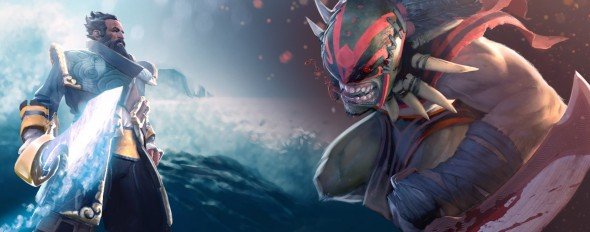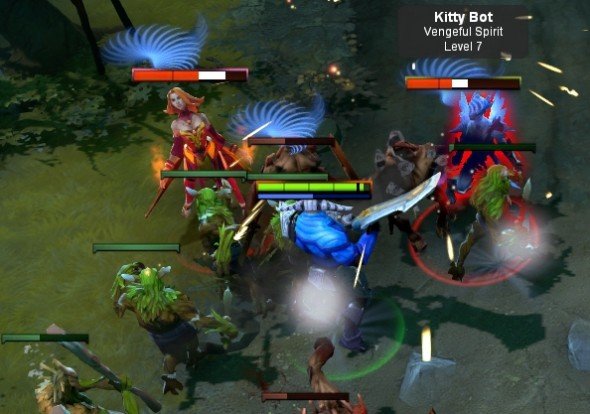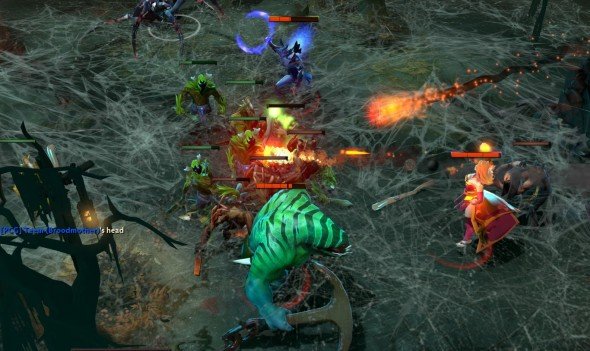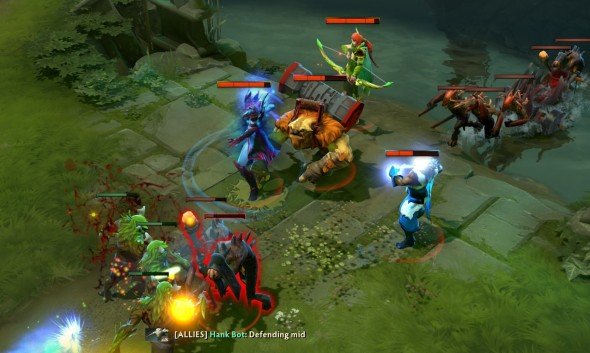DOTA 2 preview

Valve's main goal with Dota 2, says producer Erik Johnson, was “to build a sequel to a game that 20-odd million people around the world are playing”.
That's Defence of the Ancients, a free player-made map for Warcraft III. It set out the template for a strange genre of game that's since inspired a series of massive commercial releases. League of Legends alone has over 11 million active players, more than World of Warcraft.
Dota 2 sticks to the template closely: two teams of up to five players each pick a hero, and control it from a top-down perspective. But there's already a war going on, between computer-controlled soldiers called creeps. Players are far more powerful, so creeps mainly provide easy kills to boost their experience and gold.
Each hero picks and improves skills as they level up during the game, and spends money earned from their kills on magical equipment and potions. In other words, there's a very short-term RPG unfolding on top of this RTS battle. And that progression is vital, because both team's bases are protected by devastating static defence.

Early on, assault is impossible. As heroes level up over the course of a game – which is typically 30-45 minutes – they can start to make a dent in enemy defences by grouping up and taking down gun towers.
It's slow for an action game, fast for an RPG, and more focused than an RTS. Valve call it an action RTS. “It pushes how well you can think about the state of a very complex system moment to moment,” says Erik. “How well you can make good decisions moment to moment.”
Playing it, it's funny how similar the feel of Dota 2 is to Warcraft III. Valve are sticking closely to Defence of the Ancients, and DotA wasn't even a mod: it just gave new names and values to the combat mechanics of Blizzard's game. So while Dota 2 is gorgeously presented and visually crisp, normal attacks still involve two creatures standing next to each other playing swiping animations while health bars go down. It might be an action RTS, but it doesn't feel like an action game in the way the fluid carnage of Diablo III does.
Keep up to date with the most important stories and the best deals, as picked by the PC Gamer team.
It's a long, hard game of attrition and tactics. There's always an enemy force ahead that you can't handle, and it's about biding your time, improving your character and defending your territory while you look for an opportunity to push. Killing an enemy hero is a huge win, so players often dance around each other amid the fray: eager to dish damage but skittish about getting trapped. Denying the enemy experience and gold is so important that some players kill their own creeps and defences before the enemy can, robbing them of the payoff.

What makes that complicated dance particularly interesting is the diversity of the heroes themselves. There are already more than sixty to choose from, and there'll be many more before launch. Each has a small set of skills that define your role on the team. The arachnid Broodmother, for example, can spin huge webs on the battlefield that render her invisible and heal her. She can push steadily into enemy territory, making it harder for the enemy to hold and safer for her and the spiderlings she can hatch. The zombie Lifestealer, meanwhile, is a scrappy tank-killer: almost all of his skills involve chomping at enemies to restore his health while he drains theirs. His ultimate ability lets him burrow his whole body into any non-hero unit and eat them from the inside out - gaining all of their health and ambushing unsuspecting enemies.
The huge variety of playstyles and the complex systems they fit into earned DotA some fans at Valve. “A group of people in the office were playing DotA a lot,” says Erik, “and initially became a fan just of the game. And then we went through some update cycles as customers of IceFrog, and we became pretty big fans of his.”
IceFrog didn't invent the genre, or even DotA. He took over maintaining the game from Steve Feak, who left to make League of Legends. But it was the happy feedback loop that he'd created with the DotA community that impressed Valve.
“In a lot of ways [it] kind of mimics the way we think about building audiences over time,” says Erik, “where you're continuously delivering value to your customers, continuously changing the game, making it more interesting and adding content. So part of it is this lifeline to the developer that we've done over the years, with Team Fortress 2 and Counter-Strike.”

So they hired IceFrog to develop a sequel with a team at Valve. It's a game completely unlike any other they've made: it's their first fantasy game, their first strategy game, and their first RPG. But they're not interested in diluting any of those things to make it appeal to a new audience – for now, at least, Valve are primarily interested in making something for the DotA community.
That doesn't mean it'll be the same game, of course. “Part of our job is figuring out how to recognise when consensus is reached within the community, and also recognise when it's time for us to take risks,” says Erik. “It could be that it's going to take some amount of time for the community to be comfortable with a particular change.”
Some of those changes won't be to the game itself, Erik says. “There are a bunch of things outside the product that are very challenging for a DotA 1 player right now. Like how to get in and play a match with a bunch of your friends against similarly skilled opponents. That's one of the problems that we're going to solve.”
Dota 2 is intensely teamwork-heavy: if one player on your five-man team is well below your skill level, their deaths will give the other team a steady stream of experience and gold that can turn into a huge lead. So most DotA-type games have a reputation for being unwelcoming to new players. Jump into a random game, and your learning experience might be ruining a whole 40-minute game for up to nine other people.

